Northern Illinois write-In candidates face tough road to November election
By Lynne Conner For Chronicle Media — October 26, 2016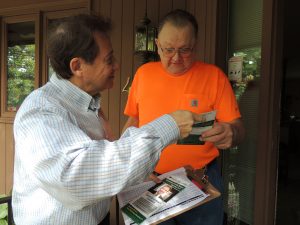
Winnebago County Board write-in candidate Kevin McCarthy stops to introduce himself and hand a campaign brochure to District 11 resident Rod Schwandt. (Photo by Lynne Conner/for Chronicle Media)
A political newcomer fighting for the safety of his district and an incumbent challenging unjust legal rulings are some of the details in Illinois’ own tale of two candidates.
Winnebago County board hopeful, Kevin McCarthy and Lake County Coroner Dr. Thomas Rudd are both running write-in campaigns and each faces a different set of hurdles on his way to the November election.
With a boots-on-the-ground approach, Kevin McCarthy is committed to meeting the folks of his district and representing their concerns to the Winnebago County Board. The boundaries of District 11, McCarthy’s home base for more than 18 years, include: Cherry Valley Township, the Village of Cherry Valley, far southeast Rockford Township and a small pocket in the City of Rockford around South Alpine and Linden Roads. McCarthy said that his decision to run as a write-in candidate for the county board grew from concerns that he and his neighbors were being under represented by current District 11 board member, Republican Dave Fiduccia. There is no Democratic candidate on the ballot.
“I attended a meet and greet where residents were asking Dave Fiduccia some questions,” he said. “Someone asked Mr. Fiduccia if he would be supporting the sheriff on a particular issue and he said, ‘Yes, I support Sheriff Caruana.’ I found out later that Mr. Fiduccia voted against the sheriff on this and other related matters. After some additional research, I discovered that he consistently goes against the sheriff’s agenda for public safety.”
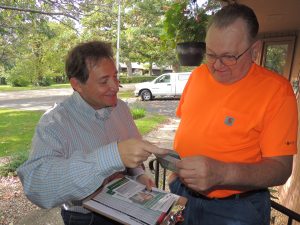
Winnebago County Board write-in candidate Kevin McCarthy stops to introduce himself and hand a campaign brochure to District 11 resident Rod Schwandt. (Photo by Lynne Conner/for Chronicle Media)
McCarthy also takes issue with the way a 2003 Public Safety Sales Tax (PSST) is being used.
“First and foremost, I want to see that 1 percent Public Safety Sales Tax used for what it was intended: cops, courts and corrections. Recently, the county board voted to move the PSST into the general fund. That’s not what the tax is there for, that’s not what we voted on in 2003. Public safety is an important part of my platform and for that reason, Sheriff Gary Caruana and State Representative John Cabello both support my bid for the county board.”
Two recent shootings at Cherryvale Mall and an Oct. 15 shooting death at the Clock Tower Resort and Conference Center reinforce McCarthy’s deep concern for public safety. Both Cherryvale and The Clock Tower Resort are located in District 11.
“We have a lack of resources which the sheriff needs. By underfunding the sheriff’s office, crime is an even more prominent issue than it was a few years ago,” McCarthy said. “Public safety is first and foremost.”
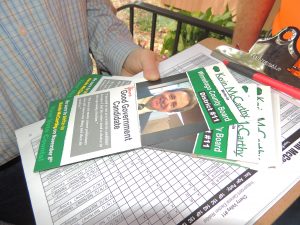
Campaign brochures and a canvassing roster keep Kevin McCarthy on track. (Photo by Lynne Conner/for Chronicle Media)
McCarthy’s outgoing personality serves him well in his day job as the director of advertising and marketing for the Diocese of Rockford. He also works as a weekend on-air personality for 96.7 the Eagle radio station.
“I would be much more responsive to the concerns of my neighbors than Mr. Fiduccia. The residents of District 11 will always get a response from me,” McCarthy said. His platform of “good government” means that McCarthy intends to be a good steward with the county’s money. “When it comes to being responsible in watching the county budget, I will be on that as well. “Where there is waste in the budget, I would work to ensure that those funds are redirected and better spent.”
Running a write-in campaign means that McCarthy has to work twice as hard to get public awareness of his name and his platform.
“When someone goes to vote for a write-in candidate, anywhere in the state, the candidate’s name needs to be written on the line provided and the circle next to the name needs to be filled in,” he said. “For example, a voter in District 11 won’t see my name on the ballot, but they need to find the blank space under the District 11 heading, write in ‘Kevin McCarthy,’ spelled correctly and then fill in the circle. Being a write-in candidate is tough. My name is not even on the ballot; however, I feel so strongly about public safety, responsible spending and transparency in government that I had to run for office and hopefully, I can precipitate a change once elected.”
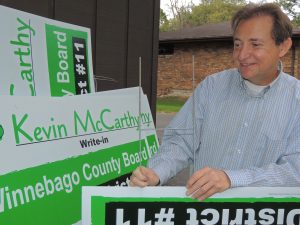
Kevin McCarthy assembles yard signs for his campaign. (Photo by Lynne Conner/for Chronicle Media)
Accuracy in a write-in bid for office is of the utmost importance and is also one of the many obstacles that hindered Rudd in his initial bid for re-election as Lake County coroner.
Rudd, a physician and pathologist, was first elected Lake County Coroner in 2012. After gathering signatures for the primary election in March of this year, mistakes were brought to Rudd’s attention by two Republican precinct committeemen.
“When I reviewed what they had brought up, and after checking with counsel, we realized that there were some mistakes and it would be best for me to withdraw from the primary race. So I did the honorable thing and withdrew from the race,” Rudd said.
Republican candidate Howard Cooper of Gurnee and Democratic candidate Michael P. Donnenwirth of Waukegan were elected in the March primary and are slated to run in the general election on Nov. 8. This created a problem for Rudd, a Democrat, who is committed to retaining his office.
“By withdrawing (from the primary race), I assumed that I could run as an Independent because I signed a piece of paper that said, ‘withdrawal of candidacy,’” Rudd said. “I was assuming that when I withdrew as a Democratic candidate, I could still run as an Independent (in the general election).”
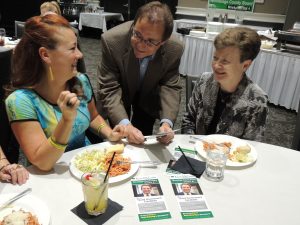
Kevin McCarthy chats with (from left) Karen Nichols-Quart & Susan Lewandowski at a campaign event on Oct. 19. (Photo by Lynne Conner/for Chronicle Media)
(Photo by Lynne Conner/for Chronicle Media)
In his quest to be on the ballot as an Independent candidate this November, Rudd was required to collect a minimum of 10,120 signatures in a 90-day period.
“We gathered almost 15,000 signatures and turned them in, fully expecting to be on the ballot,” Rudd said. “This time, the Democratic candidate, Donnenwirth, challenged the signatures.”
Rudd notes that he is endorsed by the Democratic Party of Lake County for the office of coroner. He also asserts that suspicious legal maneuvering has come into play during both signature challenges. “… What’s interesting is that he (Donnenwith), used the same lawyer that the Republicans used in the primary … . We find it interesting that the same law firm that the Republicans used is now the law firm that the Democrat is using. It’s also interesting that during these two challenges, the chairman of the GOP in Lake County, Mark Shaw, was sitting with both candidates to protest me when we went to court,” Rudd said.
After being twice challenged and twice defeated, Rudd took his case to the Lake County circuit court. He argued, in taking the case to court, “There is nothing in the law about withdrawal of candidacy. Yes, it makes sense that if you register as a partisan candidate, you can’t run as an Independent, but I withdrew my candidacy. So, went I to court.”
Just prior to Rudd’s appearance in circuit court, a legal ruling downstate seemed to greenlight his Independent name-on-the-ballot bid for coroner.
“Two days before we were supposed to have our hearing in circuit court to fight this, a judge in Effingham County, Ill. rules the law that I am being judged on unconstitutional … . We told our judge about this ruling … and she ruled against me,” he said. Rudd then took his case to appellate court and fared no better.
“Five to six days before our hearing with the appellate court of Illinois … a United States Federal Judge in Bloomington, Ill. rules the same law unconstitutional. The appellate court said, ‘Too bad, buddy, you’re off the ballot.’ The appellate court doesn’t tell us this until 10 minutes before 5 p.m. on Aug. 31. Now, why is that significant? Because, on Sept. 1, they print the ballots,” he said.
Even an appeal to the Illinois Supreme Court didn’t give Rudd the legal justification he was seeking. The Supreme Court refused to hear Rudd’s case, a move, he says was due to the fact that election ballots were already being printed. Since Rudd’s name would not be appearing on any Lake County ballots; the coroner is now forced to run as a write-in candidate.
If you ask Rudd why his reelection bid has been so difficult, his answer is brutally straightforward, “Certain law enforcement, judiciary and prosecutorial people in this county hate my guts,” he said. “I would say sloppy, bad-performing law enforcement and prosecutors are against me; not good cops, not good state’s attorneys, but sloppy, poorly trained law enforcement and prosecutorial people are against me.”
Rudd estimates that his adversaries have spent “hundreds of thousands of dollars to get me” and further asserts that his involvement in two high profile Lake County death investigations have led to the ire of law enforcement, legal and judiciary personnel.
Rudd points to the 2015 death investigation of disgraced Fox Lake police Lt. Joe Gliniewicz and in the murder case of 18-month-old Benjamin Kingan allegedly at the hands of day-care worker, Melissa Calusinski.
“I refused to go along with their homicide ruling (in the Gliniewicz case). At the time of the autopsy, I had no proof of the matter of death. I said, ‘I’m not sure what it is. You’re saying it’s a homicide, I have no proof of homicide … you have to give me proof’ … and they were furious with me,” he said. “When I saw the evidence, I thought, ‘this is ridiculous, it’s an obvious suicide. The only reason that the Crime Task Force of Lake County agreed to go with suicide (as the matter of Gliniewicz’s death) is because the FBI did the research and they found out about all of Gliniewicz’s theft and illegal activities.”
“Melissa Calusinski is a woman who was framed for murder,” Rudd said. “The autopsy was botched. I found that the autopsy evidence was totally wrong … 100 percent wrong. They claim it was an acute injury; it was an old injury. It was a documented injury that occurred on Oct. 27, 2008 at the day-care center when Melissa hadn’t even been hired. So they’re angry at me for this one. This is why they’re after me, they don’t like somebody who is honest … they can’t stand honesty,” he said.
Despite all the legal wrangling and unjust rulings sent to thwart his road to reelection, Rudd is committed to keeping his post as coroner even if it means running as a write-in candidate. Rudd probably has more name recognition than the average write-in candidate due in part to being named the 2015 Law Enforcement Executive of the Year by the Illinois Association of Law Enforcement Executives based in St. Charles. Ironically enough, Rudd received this award for thinking independently and seeking the truth despite the popularity of his actions.
— Northern Illinois write-In candidates face tough road to November election —



